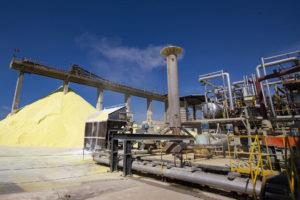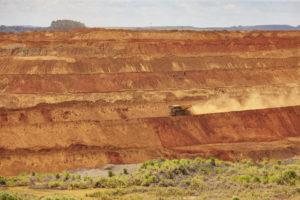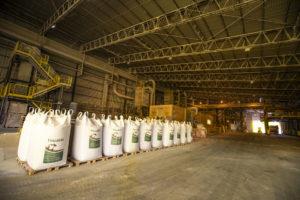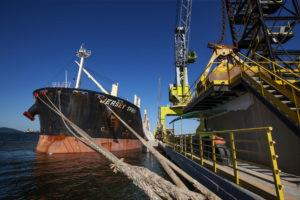(MENAFN- Brazil-Arab News Agency (ANBA))

São Paulo – The Brazilian Branch of the Mosaic Company expects to import 100,000 tonnes of phosphate from Saudi Arabia this year. The US-based company has agreements with two Saudi companies, the Saudi Arabian mining Company (Ma'aden ) and the Saudi Basic Industries Corporation (SABIC).
The agreement with Ma'aden and Sabic was signed in 2013 on an integrated phosphate production joint venture known as the Ma'aden Wa'ad Al-Shamal Phosphate Company (MWSPC), located in Umm Wu'al , North of Saudi Arabia, close to the triple border with Jordan and Iraq.
There, MWSPC has power plants and a mine that produces phosphate, phosphoric acid, and sulfuric acid. The MWSPC project also has a plant in Ras Al Khair , in the Arabian Gulf, where its ammonia, diammonium phosphate ( DAP ), monoammonium phosphate ( MAP ), and nitrogen, phosphorus, potassium ( NPK ) plants are located.

Mining at the plant in Tapira (Minas Gerais)
Mosaic's activities on Saudi soil range from project design to operation. The plant in the country's north is estimated to yield about 3 million tonnes of phosphate per year. In an email interview with ANBA, the company informed in 2021, there was no import of the Saudi input to Mosaic in Brazil, but it intends to import this year.
The Brazilian subsidiary also buys lesser amounts of sulfur and MAP from the United Arab Emirates .“The Arab countries are important suppliers of raw materials, such as sulfur, MAP, and urea, and Morocco and Jordan are also important phosphorus suppliers,” Mosaic reported.
Types of fertilizers
Fertilizers deliver nutrients to plants, and each element has a different function. Among the 14 known and essential elements for crop nutrition, nitrogen (N), phosphorus (P), and potassium (K) are in most significant demand, according to Mosaic.
Nitrogen-based fertilizers are produced by combining hydrogen gas from oil and natural gas and nitrogen gas found in the Earth's atmosphere. This reaction yields another gas, ammonia, the primary raw material for nitrogen-based fertilizers, such as urea .
Mining rocks generate phosphorus and potassium . After purification and industrial processing, they result in fertilizers containing phosphorus, such as single superphosphate, triple superphosphate, MAP, and DAP, and fertilizers containing potassium, such as Potassium Chloride (KCl).
Often the company utilizes phosphorus from Russia; however, all the potassium used in its production comes from Canada .“For these reasons, its supply chain is not dependent on Russian suppliers,” it declared.
The company clarified,“the application of fertilizers is an essential process for maintaining adequate levels of nutrients in the soil for the development of any crop, in any region – although the volume of fertilizers must consider specific assessments of each crop. Along with nitrogen and phosphorus, potassium is one of the most important nutrients for soil fertility.”
There are alternative sources of potassium to potassium chloride , Mosaic reported.“However, availability is lower and, in some cases, the use of some of these is more restricted for reasons related to agronomic efficiency or even logistical issues,” it stated.
Applications
All plants need nutrients for their development; however, the types and amounts applied during fertilization can vary according to each crop type, availability of nutrients in the soil where they will be planted, and productivity expectations, explained Mosaic.

Fertilizers are marketed to over 40 countries
“Except for crops such as soybeans, which obtain the nitrogen necessary for their development by association with soil bacteria, all other crops such as maize, wheat, coffee, sugar cane, vegetables, and fruits need nitrogen fertilizers, such as urea or ammonium sulfate,” the company said.
As for phosphorus and potassium, the company explained all crops could use fertilizers containing these nutrients in the fertilization.“To bring over some numbers, the production of a tonne of soybean extracts from the soil about 90 kg of nitrogen, 22 kg of phosphorus and 52 kg of potassium; for the production of one tonne of maize, 24 kg of nitrogen, 10 kg of phosphorus and 23 kg of potassium are needed, which demonstrates each crop has unique needs for these same nutrients,” it explained.
Products
Mosaic's fertilizer portfolio includes three performance products (MicroEssentials, Aspire, and K-Mag), a performance line launched in December 2020 (Performa), specific products for pasture nutrition (MPasto line), two specials (Excellen and Athos), seven NPKs (Fosmais, MAP, DAP, TSP, KCI, Urea, Natural Reactive Phosphate) and others within the specialty line, such as agricultural gypsum, fluosilicic acid, and limestone. The company also has a portfolio of animal nutrition products, including the Foscálcio, MPasto, and Enxofre 80s lines.
The company
Mosaic Company was founded in 2004 in Tampa, Florida, and operates in several countries across North America, South America, and Asia. The company ships around 27 million tonnes of fertilizers to over 40 countries globally.

The company operates a terminal in the Port of Paranaguá (state of Paraná)
The company has been in Brazil since 2014. Currently, it operates in over ten states, such as Minas Gerais, São Paulo, Goiás, and Sergipe, in addition to a commercial team to support customers from all regions of the country. The company also operates a port terminal at the Port of Paranaguá (state of Paraná).
With over 6,600 employees, Mosaic Fertilizantes do Brasil works with mining, production, import, marketing, and distribution of fertilizers for many crops, ingredients for animal nutrition, and industrial products. It serves over 11 Brazilian states and Paraguay, with 16 owned and six contracted units. Among them, are units in the state of Minas Gerais municipalities such as Uberaba, Tapira, Araxá, and Patrocinio, in addition to Catalão (Goiás), Cajati (São Paulo), Rosário do Catete (Sergipe), and subsidiary company Fospar (Paraná).
“Where it operates, the company fosters activities aiming to transform the productivity of the field, the reality of the places, and the availability of food in the world,” informed the company.
Translated by Elúsio Brasileiro
Press release
Press release
Press release
Press release
The post Mosaic partners with Saudi company appeared first on Agência de Notícias Brasil-Árabe .
MENAFN24032022000213011057ID1103912077